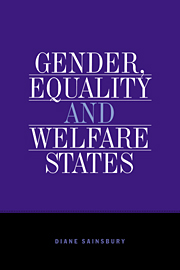Introduction
Published online by Cambridge University Press: 18 September 2009
Summary
Until the mid-1970s conceptions and studies of the welfare state largely revolved around a generic notion with little emphasis on types of welfare state. However, within the span of a few years, three works (Titmuss 1974, Mishra 1977, Furniss and Tilton 1977) containing the first efforts at constructing typologies of welfare provision initiated a trend of underlining the importance of welfare state variations. Although exceptions exist, comparative studies of welfare states and social policies have scarcely touched upon the issue of the consequences of different welfare states and social policies for women. As in many areas of social inquiry, the gender dimension has been conspicuously missing in mainstream typologies of welfare states and comparative analyses. These studies tell us little about the impact of the welfare state on women and men or the differences in impact, and they have largely ignored the disparities in welfare provision between the sexes.
On the other hand, feminist scholarship adopting a critical perspective has dealt extensively with women and social policy and underscored gender inequalities in the public provision of welfare (e.g. Lewis 1983, Baldock and Cass 1983, Ungerson 1985, Nelson 1984, Glendinning and Millar 1987, 1992, Gordon 1990). However, these studies have been set in the specific context of one country and have inadvertently reinforced a generic view of both the state and the welfare state. This tendency was also strengthened by a major current in feminist theory which views the state as an epiphenomenon of patriarchy, thus ruling out both significant variations between specific states and the possibility of variations that might be beneficial to women. Furthermore, the specific contexts of these policy studies were overwhelmingly the – English speaking countries.
- Type
- Chapter
- Information
- Gender, Equality and Welfare States , pp. 1 - 6Publisher: Cambridge University PressPrint publication year: 1996
- 2
- Cited by



